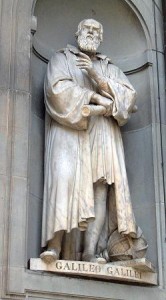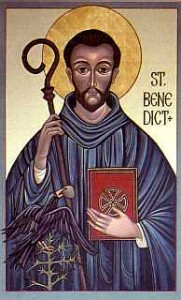1) Christianity played a crucial role in preserving the intellectual traditions of the classical world, especially Greek natural philosophy. In the Latin West, Benedict of Nursia ensured that monasteries would combine physical labour with study. Muslims probably gained many texts from Nestorian Christians. Universities grew out of cathedral schools; Franciscan and Dominican monks enthusiastically pursued knowledge of the natural world. Theologians had to study the natural world before they began their theological studies.
 2) The pioneers of the scientific method had to wait some time before they could demonstrate the practical benefits of their studies. Until then, they pursued knowledge of the natural world simply because such knowledge was considered to be a good in itself. Intellectuals would have been less inclined to study a world produced by the random movement of meaningless atoms in the infinite void. But the pursuit of natural philosophy – or science- makes sense if we are “thinking God’s thoughts after him” by studying his creation. And if physical labour could be an end in itself, so could the study of the natural world. So Christianity provided a social sanction for the study of nature and gave individuals a powerful motivation.
2) The pioneers of the scientific method had to wait some time before they could demonstrate the practical benefits of their studies. Until then, they pursued knowledge of the natural world simply because such knowledge was considered to be a good in itself. Intellectuals would have been less inclined to study a world produced by the random movement of meaningless atoms in the infinite void. But the pursuit of natural philosophy – or science- makes sense if we are “thinking God’s thoughts after him” by studying his creation. And if physical labour could be an end in itself, so could the study of the natural world. So Christianity provided a social sanction for the study of nature and gave individuals a powerful motivation.
…today almost all historians agree that Christianity (Catholicism as well as Protestantism) moved early-modern intellectuals to study nature systematically.” Noah J Effron in “Galileo Goes to Jail”
3) Notions borrowed from Christian belief found their way into scientific discourse. Christians believed that God was both rational and sovereign: a rather different world-view from the ancient’s belief that the world sprang out of chaos and was governed by Fortune. A rational, personal God would create an orderly, regular universe . This led to the belief that nature would be governed by laws.
The nature of this or that body is but the law of God prescribed to it; to speak properly a law is but a notional rule of acting according to the declared will of a superior” Robert Boyle, Notion of Nature
Identifying God as the author of mathematics was thus a crucial step in asserting the reality of mathematical relations, and it was this development which enabled the subsequent application of mathematics to the subject matter of physics. Combined with the idea of a divine legislator, this insight produced the modern view that nature is governed by mathematical laws.” Peter Harrison
4) God is pictured as a law-giver throughout the Hebrew scriptures and the New Testament. Medieval Christians also had a deep interest in God’s natural law: the moral law written on the human heart and available to human rationality. So Christians came to explain the regularity of nature by arguing that God directly imposed his will on passive matter. Furthermore, like a good engineer or clock-maker, God used mathematics to design his world. And if God is constant, rational and immutable, his laws would have similar characteristics. So began the search for the laws of nature.
Kepler … suggested that the reason Aristotelian science had overlooked the possibility of a divine imposition of mathematical order was because of Aristotle’s conviction that the world was eternal, and that the Aristotelian God did not create or impose order on the world. By way of contrast, Kepler pointed out, “our faith holds that the World, which had no previous existence, was created by God in weight, measure, and number…” Peter Harrison, Laws of Nature, Moral Order, and the Intelligibility of the Cosmos
 5) To have knowledge of the natural world, the laws of nature must not be too deep or complex for us to follow.Christians believed that we were made in God’s image. We were also made to know and worship God. It follows that were created with the intellectual ability to understand God’s creation. This belief gave intellectuals confidence that they could truly grasp and understand the natural world.
5) To have knowledge of the natural world, the laws of nature must not be too deep or complex for us to follow.Christians believed that we were made in God’s image. We were also made to know and worship God. It follows that were created with the intellectual ability to understand God’s creation. This belief gave intellectuals confidence that they could truly grasp and understand the natural world.
Those laws are within the grasp of the human mind. God wanted us to recognise them by creating us after his own image so that we could share in his own thoughts…” Kepler, Letter to Johannes George Hewart von Hohenburg
6) Unlike the ancient Greeks, who believed that the physical world was inferior to the intellectual and the spiritual, the Juadeo-Christian scriptures taught that the created realm was good. It was not shameful to get one’s hands dirty through physical labour; the physical world was also worthy of contemplation.
The enthusiasm for the new empiricism is equally well illustrated by John Wilkins, an Anglican Bishop with Puritan sympathies, a founding member of the Royal Society …’We should not be ‘so superstitiously devoted to Antiquity’, wrote Wilkins in the carefully chosen words of a 17th century Bishop, ‘as for to take up everything as Canonical which drops from the pen of a Father, …We must labour to find out what things are in themselves by our own experience…not what another says of them.’ Obvious to us now – revolutionary at the time: a good example of theological stimulation being provided to assist the emergence of the empirical method. Denis Alexander
7) God is free and sovereign. Some Ancient Greeks, like Aristotle, thought that we could discover the principles that governed the world simply through rational reflection. However, Christians believed that God was free: he was not obliged to create the world according to the principles that philosophers thought best. The only way to discover God’s plan in creation was to go out and look! This meant an increased focus on observation and experiment.
“There can be no living science unless there is a widespread instinctive conviction in the existence of an Order of Things. And, in particular, of an Order of Nature. A.N. Whitehead, Science and the Modern World.
8 ) In Christian thought, human beings are fallen creatures who lack the grace to understand God’s mind through reason alone. Christians had some grounds to doubt the effectiveness of unaided reason. So, they wanted to check our ideas about the natural world by observation, measurement and experimentation: and there is a world of difference between controlled, rigorous experimentation and passive observation. It takes a degree of scepticism about one’s own observations to put them to the test of careful experimentation.
…every man, both from a deriv’d corruption, innate and born within him, and from his breeding and converse with men, is very subject to slip into all sorts of errors….These being the dangers in the process of humane Reason, the remedies of them all can only proceed from the real, the mechanical, the experimental Philosophy’. Robert Hooke, Micrographia
———————————————————————————————————-
To be clear: we are not arguing that the Christian worldview was sufficient to bring about what we now call the scientific revolution. After all, over a millennium passed between the birth of Christ and Copernicus. Christianity’s focus has been on God’s relationship to man and man’s relationship to his neighbours. The academic study of the natural world was not a priority (although the example of Solomon and the guidance of the Wisdom literature both suggest that such study is a valuable thing).
For science to develop, people needed the leisure time to study. An abundance of leisure time requires a stable society, sophisticated agriculture and an efficient economy. These did not exist in the West for some time after the fall of Rome. Those with leisure time also needed some motivation to study the natural world. In its first centuries the Christian church faced challenges from heresy, persecution and paganism; then it had to contend with the collapse of the Latin half of the empire. It is worth noting that Roman pagan culture had done little to advance Greek natural philosophy. It would be Muslims and Christians who would take up that part of the classical tradition, long after the fall of Rome.
A variety of cultural trends nurtured the scientific revolution. For example, mathematics gained more cultural and academic esteem as navigators used it to plot courses to New Worlds and engineers and artillery officers demonstrated its efficiency. This made investigating the world with mathematics seem like a more much more reasonable bet. Nor do we wish to distract from non-Christian contributions to the genesis of science. Islam preserved and developed the classical tradition. Hindu mathematics and Chinese inventions -paper, gunpowder and the compass, for example- also played a crucial role.
So the argument is not “Christianity=the birth of science”. Of course matters were much more complex than that. The argument here is that there is a deep coherence between science and the Christian worldview. It is much more likely that people will search for laws of nature which can be described in the language of mathematics if they believe the universe is designed than if they believe it assembled by chance out of a chaotic swirl of atoms. And people will want to experiment and check their ideas if they believe we are smart enough to understand the world, but not so smart that we can do it from our armchairs.
So it is not surprising that we can trace many of the roots of science to Christian Europe; and it is not surprising that other roots did not develop so well prior to the growth of Christianity.
Further Reading
What has theology ever done for science? by Denis Alexander
Science, History and the Myths of New Atheism by Saints and Sceptics
Here we are using the term “science” to mean something like – “the systematic study of the physical world using reason, empirical experience, measurement and experimentation”.
